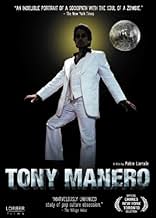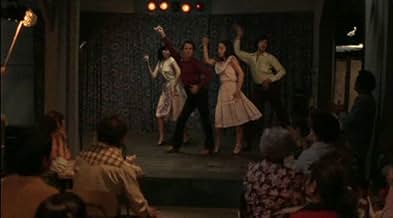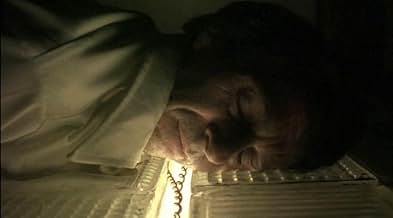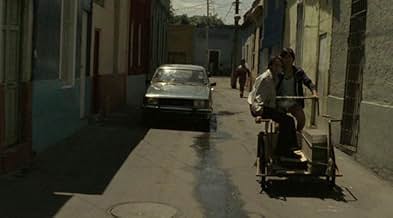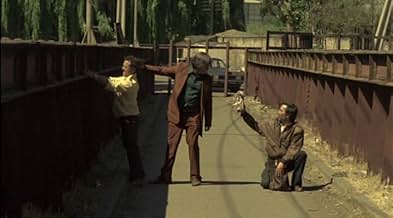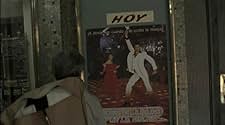NOTE IMDb
6,8/10
4,7 k
MA NOTE
Un homme est obsédé par le personnage de danseur disco de John Travolta de La Fièvre du samedi soir (1977).Un homme est obsédé par le personnage de danseur disco de John Travolta de La Fièvre du samedi soir (1977).Un homme est obsédé par le personnage de danseur disco de John Travolta de La Fièvre du samedi soir (1977).
- Réalisation
- Scénario
- Casting principal
- Récompenses
- 19 victoires et 16 nominations au total
Avis à la une
In the midst of the social context of the Pinochet dictatorship, Raúl Peralta, a man in his 50s, is obsessed with the idea of impersonating Tony Manero, John Travolta's character in the movie "Saturday Night Fever". Raúl leads a small group of dancers, who regularly perform at a bar on the outskirts. Every Saturday night, he unleashes his passion for movie songs by imitating his idol. His dream of being recognized as a successful showbiz star is about to come true when the national TV station announces a Tony Manero impersonator contest. His anxiety to reproduce the idol leads him to commit a series of crimes and thefts.
It is an extremely ambiguous film, at the same time that we feel sorry for the protagonist in the first ten minutes we feel the incredible that pulsates and disgust for its violent and obsessive data, bordering on the sick... A very interesting film with a differentiated approach, obsession for a idol, the dream of pursuing a profession and aggression taking on realistic contours...
It is an extremely ambiguous film, at the same time that we feel sorry for the protagonist in the first ten minutes we feel the incredible that pulsates and disgust for its violent and obsessive data, bordering on the sick... A very interesting film with a differentiated approach, obsession for a idol, the dream of pursuing a profession and aggression taking on realistic contours...
If the name Tony Manero means anything to anyone at all, then it will be because of a rather famous breakthrough role on behalf of a certain American actor named John Travolta, whose performance as said character in 1977's Saturday Night Fever saw him propelled into the acting limelight as this fascinating negotiator of the dance floor and charismatic presence when dialogue and exchange was required. With the release of this, a hard boiled Chilean drama directed by a certain Pablo Larraín and arriving with it the title of Tony Manero, the name threatens to take on a new found sense of identity or initial 'link' with audiences; much like the musical number "Singing in the Rain" may have done with some once Kubrick got his hands on it. Very few films that I can recall have had the ability to have you symptomatically tapping your feet at a catchy tune accompanying the somewhat elated feeling brought about by the grace of an on screen dance performance, whilst forcing you to watch proceedings through the spindly cracks that formulate out of having all of your fingers pressed together due to not really being able to watch. This Chilean film about idolisation and the impact of Western culture on foreign lands is one of them; a fascinating, a positively nihilist, take on the daring to dream whilst under a proverbial strain and is a shattering experience.
For the most part, the film plays out like this really stripped down; really rather grotty look at poor Chileans living under the tyranny of the then Pinochet-led government of the early 1980s, that just so happens to encompass a bi-polar man who's on the cusp of psychopathy and has an obsession for Travolta's aforementioned character. At the core of it is lead Raúl Peralta (Castro); a man operating within certain circles encompassing family members and contacts down at the oft-frequented local dancing club, but a man with a dangerous obsession of both the titular character of years gone by and the film from whence he comes. Peralta cuts a worn, ominous figure; a man with the mannerisms and understated sense of both threat and anger to that of Travis Bickle, an accent with a chiselled complexion plus general sense of menace to that of Pacino's Scarface anti-hero lead Tony Montana. A peek into his mind reveals the uncontrollable desire to lash out at those unsuspecting and vulnerable, the beating to death of an elderly woman, whose company he briefly shares whilst in her home, giving way to an unfathomable sense of anguish seeing him eventually take measures to make sure that her now orphaned pet cat will not remain alone and therefore starve.
Peralta's dream is to dance professionally, this unfriendly; sleazy; whore dwelling lowlife whom, at one point, loots the body of a dead man because it benefits him, desires to branch off and find success within a practice often attributed with characteristics of prouesse, elegance and splendor. Thinking he's ready for the challenge, we observe him in the opening scenes attend a televised dance competition at a studio which sees him not only turn up on the incorrect date alluding to more dangerous issues there, but completely go against rules and regulation that are established upon his arrival by heading on in and snooping around anyway, thus paying sly hint to his inability to see things any other which way but normally.
Peralta's sometimes ventures to the cinema, a local picture house showing that of John Badham's then relatively recent Saturday Night Fever to sparse audiences complete with subtitles. He breezes into the various showings at whatever time he wishes; usually just in time to catch one of the many disco-set scenes thus creating the illusion of actually walking into a disco proper ready to strut one's moves thus nicely syncing up with that of the on screen characters. A scholar of the film, Peralta is able to quote large chunks of dialogue in a stone faced and mechanical fashion; sitting there acting out the passages of play filling in for Travolta's dialogue and getting caught up in a film all about the distinction between characters both inside and outside of the dance hall, much in the same way Tony Manero goes on to explore its own lead's predicament both within his fantasy of wanting to dance and playing Travolta's part, as well as that of his true to life surroundings.
The film pays homage to that notion of Travolta's very specific character from that very specific 1977 film being such a mover and such the focal point he was; Manero was a man at the centre of everybody's diegetic attention, an attention which matched up with that of the audience's, somebody whom the camera went out of its way to embrace or to incorporate whilst they danced to imbue proceedings with a sense of objectification. Peralta's gradual obsession with Manero might be read into as being born out of this, his utilisation of dance as a means of escaping the dishevelled living conditions he inhabits going in perfect tandem with that of Manero's own use of the dance hall as a place he can become somebody else; the injustice which later befalls him an injustice essentially something born out of the lack of democratic procedure in regards to voting, something reflective in the real Chile where politics and freedom and such do not link up so easily. The film's chugs through to a disturbing final shot, a composition hinting at Peralta's now newfound sense of coming to terms with the nature of his world of escape merely an extension of the unfair reality he sought to get away from; on the other hand, a shot alluding as much to a man already beneath the line of sanity so much so that he really doesn't care either way. Larraín's hard hitting drama makes for fantastic watching; the results of which are some morbid, gripping viewing.
For the most part, the film plays out like this really stripped down; really rather grotty look at poor Chileans living under the tyranny of the then Pinochet-led government of the early 1980s, that just so happens to encompass a bi-polar man who's on the cusp of psychopathy and has an obsession for Travolta's aforementioned character. At the core of it is lead Raúl Peralta (Castro); a man operating within certain circles encompassing family members and contacts down at the oft-frequented local dancing club, but a man with a dangerous obsession of both the titular character of years gone by and the film from whence he comes. Peralta cuts a worn, ominous figure; a man with the mannerisms and understated sense of both threat and anger to that of Travis Bickle, an accent with a chiselled complexion plus general sense of menace to that of Pacino's Scarface anti-hero lead Tony Montana. A peek into his mind reveals the uncontrollable desire to lash out at those unsuspecting and vulnerable, the beating to death of an elderly woman, whose company he briefly shares whilst in her home, giving way to an unfathomable sense of anguish seeing him eventually take measures to make sure that her now orphaned pet cat will not remain alone and therefore starve.
Peralta's dream is to dance professionally, this unfriendly; sleazy; whore dwelling lowlife whom, at one point, loots the body of a dead man because it benefits him, desires to branch off and find success within a practice often attributed with characteristics of prouesse, elegance and splendor. Thinking he's ready for the challenge, we observe him in the opening scenes attend a televised dance competition at a studio which sees him not only turn up on the incorrect date alluding to more dangerous issues there, but completely go against rules and regulation that are established upon his arrival by heading on in and snooping around anyway, thus paying sly hint to his inability to see things any other which way but normally.
Peralta's sometimes ventures to the cinema, a local picture house showing that of John Badham's then relatively recent Saturday Night Fever to sparse audiences complete with subtitles. He breezes into the various showings at whatever time he wishes; usually just in time to catch one of the many disco-set scenes thus creating the illusion of actually walking into a disco proper ready to strut one's moves thus nicely syncing up with that of the on screen characters. A scholar of the film, Peralta is able to quote large chunks of dialogue in a stone faced and mechanical fashion; sitting there acting out the passages of play filling in for Travolta's dialogue and getting caught up in a film all about the distinction between characters both inside and outside of the dance hall, much in the same way Tony Manero goes on to explore its own lead's predicament both within his fantasy of wanting to dance and playing Travolta's part, as well as that of his true to life surroundings.
The film pays homage to that notion of Travolta's very specific character from that very specific 1977 film being such a mover and such the focal point he was; Manero was a man at the centre of everybody's diegetic attention, an attention which matched up with that of the audience's, somebody whom the camera went out of its way to embrace or to incorporate whilst they danced to imbue proceedings with a sense of objectification. Peralta's gradual obsession with Manero might be read into as being born out of this, his utilisation of dance as a means of escaping the dishevelled living conditions he inhabits going in perfect tandem with that of Manero's own use of the dance hall as a place he can become somebody else; the injustice which later befalls him an injustice essentially something born out of the lack of democratic procedure in regards to voting, something reflective in the real Chile where politics and freedom and such do not link up so easily. The film's chugs through to a disturbing final shot, a composition hinting at Peralta's now newfound sense of coming to terms with the nature of his world of escape merely an extension of the unfair reality he sought to get away from; on the other hand, a shot alluding as much to a man already beneath the line of sanity so much so that he really doesn't care either way. Larraín's hard hitting drama makes for fantastic watching; the results of which are some morbid, gripping viewing.
The film, which conveys impressions from a country that is politically and economically collapsed, shows us how martial law situations actually get people out of control psychologically and sociologically rather than creating a control mechanism. You are increasingly watching your character's obsessions about the role model of a psychopathic character and their relationship with other people.
TONY MANERO (dir. Pablo Larraín) The film is set in Chile during the fascist reign of Augusto Pinochet, and focuses on a man who is obsessed with John Travolta's discotheque super-star character in Saturday NIGHT FEVER. This might have been played for laughs, but Pablo Larrain's film is an evil fantasy of disco glory that portrays an obsessive and twisted character who is willing to kill to to fulfill his grotesque vision of acclaim. The frenzied violence in this film is so sudden and inexplicable that it literally takes your breath away. The film seems to present a subtle metaphor that compares the highly stylized nature of disco to the uncompromising fascist posturing of totalitarianism. ABSOLUTE MUST SEE
It is a very interesting Chilean film; it has a strange plot and the acting is good; it is a very bizarre experience.
Le saviez-vous
- AnecdotesSome clips and tunes from both La Fièvre du samedi soir (1977) and Grease (1978) appear in this film, the most prominent song heard is The Bee Gees' "You Should Be Dancing" from Saturday Night Fever. The final credits acknowledge Paramount Pictures for use of both films in this picture.
- GaffesThe "Members Only" jacket worn by Raul wasn't introduced until 1981, and the film takes place in 1978.
- Citations
Title Card: [first lines]
Don Enrique: [subtitled version] And now we present our look-alike contest: 'The One O'clock Festival'
Security Guard: Wait here, please.
- ConnexionsFeatured in Sin maquillaje: Alfredo Castro (2011)
Meilleurs choix
Connectez-vous pour évaluer et suivre la liste de favoris afin de recevoir des recommandations personnalisées
- How long is Tony Manero?Alimenté par Alexa
Détails
Box-office
- Montant brut aux États-Unis et au Canada
- 20 677 $US
- Week-end de sortie aux États-Unis et au Canada
- 3 305 $US
- 5 juil. 2009
- Montant brut mondial
- 687 406 $US
- Durée
- 1h 37min(97 min)
- Couleur
- Mixage
- Rapport de forme
- 1.85 : 1
Contribuer à cette page
Suggérer une modification ou ajouter du contenu manquant


